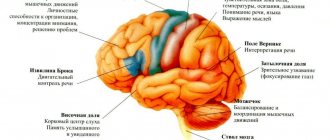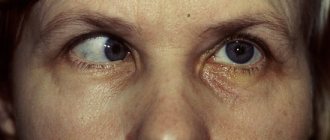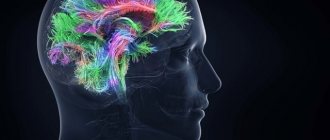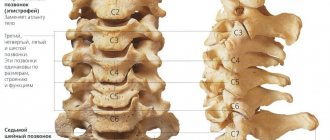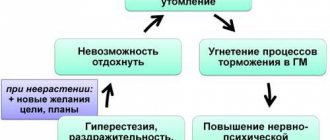The harmful effects of alcohol-containing products on the body have been known for a long time. Abuse of alcoholic beverages for quite a long time leads to the development of various pathologies. Quite often, alcoholics are diagnosed with Korsakov amnestic syndrome , which is expressed in memory disorders. The patient loses the ability to remember current events, while memory of the past is still present.
The Russian psychiatrist S.S. Korsakov studied and described this condition, and the syndrome later received his name.
Initially, it was believed that such memory impairments occur as a result of prolonged consumption of alcohol in large quantities. But further research of this issue by other psychiatrists showed that the main reason for the development of the pathology described by Sergei Korsakov is a lack of vitamin B1, which can be caused by various disorders of the entire central nervous system and individual areas of the brain, including age-related degenerative processes.
Modern psychiatry considers Korsakov's syndrome as an independent nosological unit, which is a special type of amnesia.
Manifestations of Korsakov's syndrome
According to medical reference books and a large psychological encyclopedia, the main symptom of this disease is the inability of a sick person to remember and reproduce new information (fixation amnesia). Everything that happened before the illness was well preserved in memory. A person’s consciousness does not record events that happened with his participation very recently or are happening at the moment. Clinically this manifests itself as follows:
- the patient is poorly oriented in space if he finds himself in a new place. While in a hospital, a person is unable to find the room or bed he needs, but at home such problems do not arise. This is because long-term memory works relatively normally. Moving to a new place or simply rearranging furniture can become severe stress for the patient, which can give impetus to the rapid progression of the disease;
- disorientation in time. If a person has been diagnosed with Korsakoff syndrome , then most likely he will not be able to correctly name today's date, month and year. He simply does not understand where he is and what is happening to him;
- in a conversation, the patient mentions events that have never happened to him (confabulation). The patient's stories can be fantastic; you can hear from him that yesterday he fought with monsters in another universe or sailed in a submarine. Those around him consider this to be fiction or an outright lie, but the patient himself has no idea that he is telling a lie;
- events that have ever taken place in a person’s life are shifted in time space (pseudo-reminiscences). In this way, memory gaps are involuntarily filled. A person’s stories are quite ordinary in nature; he can say that yesterday he went to the theater for a new production or went out of town. But in fact, these events happened much earlier;
- replacing gaps in memory with events from movies or books. The patient has some information, but he does not know when and how he received it. For example, he can pass off a poem he once memorized as his own work. Over time, the sick person perceives other people's thoughts as his own.
- Concentration is difficult, willpower is reduced.
Korsakoff's syndrome is often accompanied by retrograde or anterograde amnesia. The patient's emotional state is unstable. Lethargy, indifference and apathy are replaced by complacency and euphoria.
Treatment of Korsakoff psychosis in alcoholism
No matter how sad it may sound, all mental disorders (including Korsakov’s) are difficult to treat, but significant improvement is possible.
Treatment of Korsakoff psychosis is aimed primarily at eliminating the causes of the disease. For this, the skills of doctors such as a psychiatrist, neurologist and narcologist are used.
First of all, in order to get a good therapeutic effect, you need to completely give up alcohol, and then carry out complete detoxification of the body. For this, salt solutions or glucose are often used.
The full treatment course consists of the following stages:
- giving up alcohol;
- removal of toxic substances from the body and introduction of the necessary vitamin complex, which necessarily contains thiamine. Vitamins help eliminate the symptoms of polyneuritis;
- the use of antipsychotics to suppress the development of a mental disorder;
- administration of antidepressants to reduce anxiety;
- administration of drugs that stimulate brain function;
- prescribing a special protein diet;
- mandatory psychological sessions aimed at returning to normal life;
- engage in physical activity, massage to restore muscle tone and eliminate paralysis.
Various techniques are used to improve and restore memory. For better memorization, patients often use notepads. There they record everything that happens to them. It is very important to eliminate the apathetic state that a person learns to take care of his appearance and perform hygiene procedures.
The success of treatment depends on the complexity of the situation and the wishes of the patient and can last for decades. Often all efforts are wasted because the patient returns to drinking strong drinks. In such cases, a person’s dementia and even death are quite possible.
Young patients who are ready to completely give up alcohol consumption for the sake of recovery have a greater chance of full recovery.
Fortunately, in our time, polyneuritic psychosis is and can be eliminated even in the initial stages with the help of B vitamins.
Reasons for formation
The development of Korsakoff's syndrome is caused by a lack of thiamine (vitamin B1) in the body. This microelement is involved in the mechanism of formation of nerve impulses and their transmission between individual nerve cells. Disturbances in these metabolic processes lead to the deep structures of the brain suffering.
Such vitamin deficiency, as mentioned above, most often develops as a result of prolonged alcohol consumption, since the body’s absorption of this vital microelement is disrupted. First, the alcoholic develops acute encephalopathy, which, if left untreated, in most cases leads to the development of Korsakoff's syndrome.
Other causes of Korsakoff amnestic syndrome are:
- Severe head injuries affecting different parts of the brain.
- Age-related degenerative processes such as Alzheimer's type dementia and Pick's disease.
- Diseases of the nervous system caused by various infections.
- Encephalitis of various types.
- Intoxication of the body, including heavy metals.
- Diseases of the digestive tract and vomiting that continues for a long time.
- Constant malnutrition due to alcoholism, the fight against excess weight with the help of debilitating diets or fasting.
- As a side effect of chemotherapy.
- The consequence of surgical operations on the temporal lobes, they are performed to treat epilepsy.
All of these neurological diseases affect limbic structures, organic damage to which can cause serious malfunction of the brain.
A case of the development of amnestic syndrome after a patient was bitten by a centipede, which is found in Japan, was also described. Insect venom penetrates various parts of the brain and blocks the processes responsible for the normal functioning of memory.
Korsakoff's amnestic syndrome may not progress for many years, and with timely and competent treatment, regression of the main symptoms is observed. However, if the disease is ignored, Korsakov's psychosis develops. The patient in this state is completely unable to navigate in time and space, and no longer recognizes the people around him. He has delusional thoughts and ideas, which are immediately erased from memory, and isolated hallucinations may also occur.
History of Korsakov's psychosis
Korsakov's psychosis is a disease of chronic alcoholics, which is associated with damage and manifests itself as a mental disorder that occurs mainly in the third stage of alcoholism.
The disorder got its name from the name of the Russian psychiatrist who described it in 1877. Sergei Korsakov proved that alcoholism is a disease that needs to be fought. He found that this psychological condition is preceded by alcoholic encephalopathy. Initially, the doctor called it “polyneuretic psychosis,” since polyneuritis is the destruction of the peripheral nervous system.
Diagnostic methods
A diagnosis such as Korsakoff syndrome can be made after detecting signs of vitamin B1 deficiency. A blood test and testing of basic liver functions can indicate a thiamine deficiency. In addition, a general examination of the patient is carried out. However, to make a clinical diagnosis, it is necessary to have a stable symptom - impaired memory function due to prolonged use of alcoholic beverages. Psychological tests for memorizing phrases or individual words help identify memory problems.
For treatment to be successful, it is important at the diagnostic stage to differentiate Korsakov's syndrome from other pathological processes in the nervous system, which can also be caused by alcoholism. It is also important to rule out other disorders that may cause memory problems that are not related to alcohol use. These include: dementia, organic brain damage, depressive disorders, etc.
How to determine
Mostly, pathology is determined from the patient’s words. They are then supported by specialist examinations and research. The patient requires consultation with a psychiatrist who differentiates amnesia from other similar conditions, and a neurologist who will work on the situation with muscle atrophy. Diagnostic methods include MRI to determine the degree and presence of brain atrophy, EEG, CT and blood tests for biochemistry. A thorough diagnosis will make it possible to separate Korsakoff psychosis from similar pathologies, for example dementia.
Treatment and prevention
Treating Korsakoff syndrome is quite difficult. The success of therapy will depend on many factors, including:
- degree of social adaptation of the patient;
- his age;
- health status;
- duration of alcohol consumption;
- degree of brain damage.
The main problem is that a person who begins to develop Korsakoff's syndrome does not realize it. Memory lapses can also remain invisible to others, since the patient masks them with long statements and florid thoughts. Even after diagnosis, patients often refuse treatment, considering themselves completely healthy people.
Treatment carried out after diagnosis is aimed at eliminating the cause that caused it. If memory defects are the result of alcoholism, then the basis of therapy is drugs containing thiamine and other trace elements that can minimize brain damage.
Nootropic drugs can significantly improve memory, increase the patient’s attentiveness and learning ability. If anxiety and increased excitability are present, the patient may be prescribed antipsychotic drugs in small doses.
Diagnosis of mental disorder
Diagnosing Korsakoff psychosis is quite simple, judging by the symptoms. It is better to examine such patients and discuss treatment tactics in the presence of relatives. When making a diagnosis, it is very important to exclude other causes of the disease. If the disease did not occur through alcohol addiction, then the treatment will be different.
To make a diagnosis, first of all, the patient must be completely examined, blood taken, and in addition to general tests, the thiamine level must be examined. It is also necessary to check the functioning of the liver (do an enzyme test), possible disturbances in coordination during movement, and the correct functioning of the brain. Specialists are required to conduct tests that can help determine memory disorders and the ability to process information, as well as determine the level of memorization of new information. Tests are carried out on the oldest area of the brain - the limbic system. It is responsible for converting short-term memory into long-term memory. If during the tests damage to at least one part of the system was detected, then a diagnosis can be made.
Often, patients do not realize their disorder and, accordingly, do not seek help themselves. Therefore, it is very important to do all the necessary examinations and study the clinical picture in detail in order to prescribe the most effective treatment.
Risks and forecasts
It is almost impossible to completely get rid of a disease such as Korsakoff syndrome, since brain damage is often irreversible. But with timely treatment, it is possible to stop the development of the disease, as well as significantly improve the patient’s condition.
Recently, the number of patients with Korsakoff's syndrome has decreased markedly, since thiamine is used in the treatment of alcoholism at all its stages. As a result, it is possible to prevent the development of vitamin B1 deficiency, which is the main cause of amnestic syndrome.
In addition to people leading an antisocial lifestyle and abusing alcohol, people who may be exposed to the following factors are also at risk:
- treatment of cancer using chemotherapy;
- dialysis;
- radical dietary restrictions caused by the desire to lose weight or religious beliefs;
- advanced age;
- genetic predisposition.
Since the disease is based on a certain pattern of behavior, for example, alcoholism or poor nutrition, Korsakoff's syndrome is highly preventable. First of all, it is necessary to limit the consumption of alcoholic beverages, as well as introduce foods containing B vitamins into the diet. The latter is important for all people, since thiamine is necessary for vital processes, but it is not synthesized in the body.
Why does it appear
It is clear that the main cause of alcoholic psychosis is the consumption of strong alcoholic drinks for many years. This usually results from acute psychosis. It is often provoked by exacerbations of pathologies of the digestive system, such as the liver. The syndrome develops against the background of a lack of nicotinic acid in the body, as well as thiamine. Due to excess alcohol and poor nutrition, digestive problems occur, which results in problems with the brain, as mass death of its cells begins.
Forecast
The prognosis of Korsakoff syndrome is considered favorable and quickly curable if the disease began to develop as a result of trauma to the brain, skull, or subarachnoid hemorrhage. The worst thing for the patient is if the disease begins its active development after a heart attack or during a lack of thiamine in the body. In this case, the victims require hospital treatment.
Attention! Even with proper adherence to the treatment regimen, only 20% of patients are completely cured of Korsakoff syndrome. The treatment will have a positive effect on the health of patients after 12-24 months, during which the treatment should proceed in full. First, the therapy will take place in a hospital, after which the person will need to take medications at home, as well as visit sanatoriums every six months.
Prevention of Korsakov's psychosis
It is much easier to prevent any disease than to cure it. The most important thing is to lead a healthy lifestyle that excludes the use, and most importantly, the abuse of alcohol.
essential into your diet . It doesn’t hurt to undergo regular medical examinations in order to promptly identify and prevent the development of various diseases.
It is very important to seek medical help in a timely manner, and even better not to abuse alcohol.

